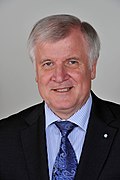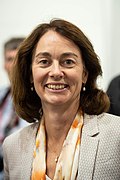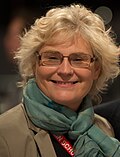Fourth Cabinet of Angela Merkel Cabinet Merkel IV | |
|---|---|
| 23rd Cabinet of the Federal Republic of Germany | |
| 14 March 2018 – 26 October 2021 (until 8 December 2021 as caretaker government) | |
 Signing of the coalition agreement for the 19th Bundestag on 12 March 2018 | |
| Date formed | 14 March 2018 |
| Date dissolved | 8 December 2021 (3 years, 8 months, 3 weeks and 3 days) |
| People and organisations | |
| President | Frank-Walter Steinmeier |
| Chancellor | Angela Merkel |
| Vice-Chancellor | Olaf Scholz |
| Member parties | Christian Democratic Union Social Democratic Party Christian Social Union in Bavaria |
| Status in legislature | Grand coalition |
| Opposition parties | Alternative for Germany Free Democratic Party The Left The Greens |
| Opposition leaders | Alice Weidel (AfD) & Alexander Gauland (AfD) |
| History | |
| Election | 2017 federal election |
| Legislature terms | 19th Bundestag |
| Predecessor | Merkel III |
| Successor | Scholz |
| ||
|---|---|---|
Revolution of 1989 Kohl government Leader of the Christian Democratic Union First ministry and term
Second ministry and term
Third ministry and term
Fourth ministry and term | ||
The Fourth Merkel cabinet (German: Kabinett Merkel IV) was the 23rd Government of the Federal Republic of Germany during the 19th legislative session of the Bundestag. It was sworn in on 14 March 2018 following the 2017 federal election and dismissed on 26 October 2021, acting in a caretaker mode until 8 December 2021. It was preceded by the third Merkel cabinet and succeeded by the Scholz cabinet. Led by Chancellor Angela Merkel, it was the third cabinet under Merkel to be supported by a coalition of the Christian Democratic Union (CDU), the Christian Social Union of Bavaria (CSU), and the Social Democratic Party (SPD).


































